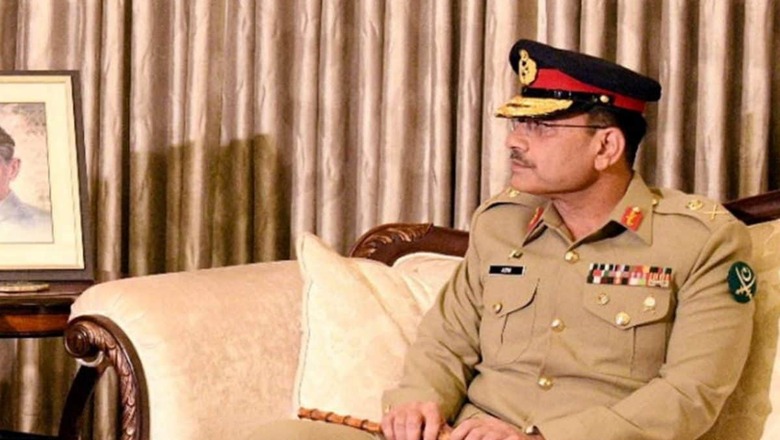
views
Pakistan’s Generals, at least those still surviving, are in a state of outrage following the May 9 storm against the establishment. The Army announced that it had removed several senior officers from their jobs after an inquiry. This is unprecedented in the army’s history. All of this happens as the Chief Justice is also under attack for hearing petitions against the trial of civilians in army courts. Institutions are pitched on against the other, and while any bookie would back the army in this struggle, the odds are wearing thin.
DG ISPR blows the whistle
The announcement by Major General Ahmed Sharif Chaudhry, Director General ISPR (Inter-Services Public Relations), made several startling announcements. One, disciplinary proceedings against several officers ‘including’ a lieutenant-general, three major generals and seven brigadiers, have been completed. There was a great stress on the fact that the actions were not due to complicity, but ‘procedural lapses’ and ‘inadequacies’ of security arrangements.
That was not all. The General, who announced all this in a suitably grave and even threatening voice, also said that a granddaughter of a retired four-star general, son-in-law of a retired four-star star general, wife of a retired three-star general, and wife and son-in-law of a retired two-star general are facing this process of accountability. This confirms earlier reports that some sections of the army, retired or otherwise, were indeed in support of Imran Khan, and more importantly of his cause to reduce the army’s role in politics.
Then look at the Twitter page of the Pakistan Ex-Servicemen’s Society. It is mainly an endorsement of Major (retd) Adil Raja, who has been the most vocal against the army’s many excesses. That means a large and powerful body is also against the present excesses. That can’t be a good portent for the fist-waving Army chief Gen Asim Munir, who seems to be intent on showing his strength. Overall, the ultra-conservative General’s actions are puzzling.
Pakistanis are calling the whole violence a ‘False Flag’ operation, a position that gains currency to a Military Intelligence report that pointed fingers at the Intelligence Bureau — under the control of a vengeful Interior Minister Rana Sanaullah, and the Ministry of Defence. If this was a false operation, then there was the obvious target, Imran Khan. The arrest of senior generals shows a second target. That could be those he doesn’t trust, or are supportive of Gen Faiz Hameed, still a power to reckon with. The key question: Why didn’t he fire his ISI chief, Gen Nadeem Taj? Surely if the operation was real, the whole was a huge intelligence failure? Given that, this looks more like a clean-up of those supporting his rival.
Handling the civilians
The DG, ISPR has also said that some hundred plus civilians are also to be tried in military courts. In addition, prominent voices on social media, with most successful ‘influencers’ all living abroad, are arguing against such an ignominy. The Islamabad police issued FIRs against most of them, including Adil Raja in the UK, Shaheen Sehbai in Virginia, USA, and Wahajat Khan from the Atlantic Council, Washington, among others. Then there were a series of high-profile arrests of senior leaders of the Pakistan Tehreek e Insaf, with the bitter result of most of them resigning from the party. However, Khan himself hasn’t shied away from using military courts in his time. Remember, Idris Khattak accused of espionage, and tried in a secret military court. The family still has no idea of his whereabouts.
The Pakistan Army Act 1952 does allow trial of civilians, earlier only those employed by it. Thereafter it has been extended by an Amendment in 1977, to include those who attack or destroy any military property. It does allow right of appeal, but that is not apparent in Khattak’s case or that of Hasan Askari, son of a retired senior military officer who was tried for questioning the extension given to General Bajwa, or 25 others were also tried under military courts. Transparency? None whatsoever.
Of these, three were awarded the death sentence. Imran Khan was the head of government on both these occasions. That’s not whataboutery. That’s a lesson that Prime Minister Shahbaz Sharif and his cronies should understand: that erosion of the Constitution could cook your own goose.
Supreme Court stands firm
The Pakistan army’s use of military courts was a card forced on them by Chief Justice Umar Ata Bandial who has courageously(or foolishly depending on where one sits) challenged the state repeatedly by giving pre-arrest bail to Imran Khan, and now many of his workers have been arrested. His efforts to create a nine-member bench to hear appeals against the use of military courts have seen judge after judge recuse himself. Nonetheless the hearings proceeded with a 6-member bench directing the Attorney General that all arrested (which at the time of writing seems to be 102) be allowed access to their families. The learned judges, while observing that the “Army, the National Security Council are speaking the same language and the National Assembly had passed the resolution” on the military courts, is also questioning the process.
Meanwhile, the Chief Justice ‘expects’ that the military courts will not commence till it has heard the petitions. That is the key. Already, there are signs of backtracking, as the Judge Advocate General says that suspects would be tried under Sections 3, 7, and 9 of the Official Secrets Act read with Section 2(1)(d) of the Pakistan Army Act. That’s the widest clause of all, and covers nearly any punishable offence. And with that prominent lawyers are noting that there is no precedent for trying anyone under the Official Secrets Act in civil courts. Meanwhile, even the most liberal of editorials are asking the Chief Justice to dial it down, and ‘reform’ the court — which in effect means eroding the CJ’s discretionary power to appoint judges, which in turn, means giving it to the establishment. The tide has turned.
Overall, therefore, it seems the army has won, with its relentless witch-hunt of not just the political opposition but from its own ranks. What was once an institution that most Pakistanis — and their external sponsors and interlocutors — respected as the only bonding force in the country is today anything but. Even in India, there was a degree of respect for the army as being disciplined, and working in its country’s interests. That has been replaced by alarm as the present chief lets loose the dogs of war within his own country and within his own ranks.
There is a view that Gen Munir’s actions are being done in the direction of a China that is justifiably worried about its investments in Pakistan. The public tongue lashing by Chinese Foreign Minister Qin Gang recently, where he essentially asked Islamabad to get its act together, is only one indicator. But Pakistan is not China. What works for Beijing, will certainly be disastrous for Islamabad. Gen Munir may well go down in history as the man who broke the back of his own institution. That’s tragic. For everyone.
The author is a Distinguished Fellow at the Institute of Peace and Conflict Studies, New Delhi. She tweets @kartha_tara. The views expressed in this article are those of the author and do not represent the stand of this publication.


















Comments
0 comment